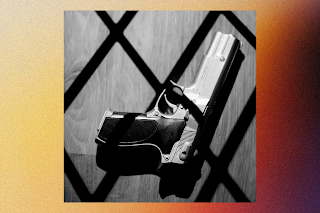The 6-3 ruling in the case is a major victory for gun rights advocates who had challenged New York’s restrictive law, which makes it a crime to carry a concealed firearm without a license.
It also represents the Supreme Court’s biggest expansion of gun rights in more than a decade — and casts doubt on laws in eight other states and the District of Columbia that restrict concealed-carry permits in ways similar to New York.
Unsurprisingly, the case was supported by the NRA, but it has also generated support from typically liberal public defenders, like Sharone Mitchell Jr.
Mitchell is the public defender for Cook County, which includes Chicago — a city with some of the strictest gun laws in the country. Growing up on the South Side, Mitchell was raised to believe that guns are dangerous and harmful, and that was reinforced by his experiences as a public defender and gun control advocate. But those experiences have also led him to believe that gun permitting laws are harmful.
In the latest episode of New York Times Audio podcast, First Person, Mitchell joins host Lulu Garcia-Navarro to talk about his complex views on what it means to keep a community safe.
You can listen to this episode of First Person on Apple, Spotify or Google or wherever you get your podcasts.
The full transcript of the interview can be found here, with highlights below:
Sharone Mitchell Jr.
I think that my values are defined by the issues that are put before me and not the people who decide to take up that certain issue, if that makes sense, right? So while being on the same side of the N.R.A. is not something that I’m going to be putting on my LinkedIn, I am supportive of not sending people to prison because they don’t have a license. And I don’t support laws being enforced in a way that only certain types of people go to prison for this charge. A system that is just so on its face racist is something that we need to work against.
Lulu Garcia-Navarro
So just to make sure I’m clear, you want to see the system of licensing and permitting for guns go away?
Sharone Mitchell Jr.
I think that the current — how the licensing exists in New York and how the licensing exists in Illinois is broken. The scheme doesn’t limit access to guns, like that’s the whole point. I am very much for proposals that actually reduce the flow of guns in our community. I’m very much for repealing all of these legal fictions that give the gun industry immunity away from civil lawsuit. I’m very much for prohibiting the manufacture of assault weapons that are literally ripping our children apart or prohibiting the production of high-capacity magazines. I’m for just a host of things that are actually going to reduce the flow of guns in our community.
But what I’m saying is that what the Supreme Court is looking at is not doing that. We have licenses on the books right now. And every morning, we get a reminder in Chicago and in almost every other urban area how that strategy fails.
Lulu Garcia-Navarro
For most of the people who hold the view though that there are too many guns in this country, that guns are a bad thing, what you’re putting forward, getting rid of requirements that guns should be licensed, is pretty much everything they’ve been fighting against. The case taken to the Supreme Court by the N.R.A. is about expanding gun access. So it seems to me that you’ve reached a kind of place in your view of what’s possible in this country where the only effective solution you see when it comes to guns is one that acknowledges that they’re going to be ubiquitous in American life?
Sharone Mitchell Jr.
I just think it’s a little bit more complicated than that. So if we look at the New York case, right now what exists is that the New York Police Department can basically tell people — they have unilateral discretion to determine who gets a license for a gun. And then that same police department turns around and only arrests Black and brown people for not having gun licenses.
I think that there is a better way of exploring safety.
*******************************
I recommend this episode. It elevates the discussions of guns above the typical ranting about Second Amendment rights and explores deeper issues related to guns on a social, cultural and racial level.
You can listen to this episode of First Person on Apple, Spotify or Google or wherever you get your podcasts.

Comments
Post a Comment
Thank You for your input and feedback. If you requested a response, we will do so as soon as possible.